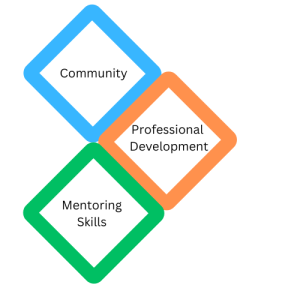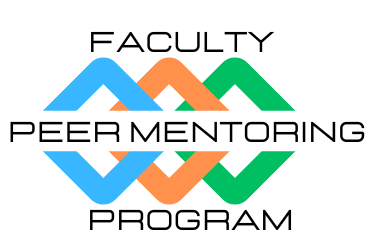Faculty Peer Mentoring Program
Program Overview
The purpose of the Faculty Peer Mentoring Program is to provide support and resources for tenure-track faculty through “cluster peer mentoring” and CTL-facilitated opportunities for professional and scholarly advancement in participants’ faculty roles.
The program is designed for tenure-track and tenured faculty in educational leadership and research streams. It is intended to supplement rather than replace existing informal and formal inter-departmental mentoring.
Registration for the program opens in July and formal activities will begin in September and conclude in early May. There is no limit on participation from year to year, and the program is designed to foster long-term relationships and ongoing mentoring skill development. In the event of capacity limitations, preference will be given to new applicants.
Program components include monthly workshops, mentoring clusters, and additional resources through a Canvas site, including a professional action plan template for participants to complete with their goals, metrics, and reflections.
Registration for 2025-26 IS OPEN! APPLY NOW!
For information about this program, please contact Barbara Komlos (barbara.komlos@ubc.ca).
To facilitate the assignment of mentoring “clusters,” priority will be given to applications received by August 31st.

Community
Connect faculty across academic programs and educational leadership and research streams through mentoring relationships to foster a sense of belonging, support one another’s professional development goals, and deepen relationships with the Centre for Teaching and Learning.
Professional Development
Foster reflection and discussion around effective, learner-centered teaching and learning practices, and scholarly activity/research in the context of faculty career progression.
Mentoring Skills
Model and provide opportunities to practice effective mentoring strategies applicable to leading teams, supervising students, and inspiring peers around teaching and scholarship within and beyond the program.
Overall Benefits
- Building connections with colleagues across programs & disciplines
- Professional development training on various topics
- Learning mentoring skills applicable to different contexts
- Structured opportunity to set and be accountable to professional goals
- Having multiple colleagues provide input and guidance
- Opportunities to practice and refine mentoring & communication skills
- Inspiration and ideas around teaching
- Increase overall career satisfaction
Additional benefits for tenure-track faculty:
- Insights into teaching, research, and service in UBCO context
- Guidance around tenure process
- Building network of collaborators
Additional benefits for tenured faculty:
- Fulfilment around sharing experience and institutional knowledge
- Guidance around promotion process
- Alignment with leadership opportunities
- This program is about helping others identify and build on strengths.
- Learning happens through and in relationships that are co-created.
- Reflection is an essential catalyst for professional growth.
- Everyone can be a mentor regardless of institutional role.
- Mentors are not born; they are cultivated.
- Framing of roles and naming of goals at the start paves the way for collective understanding and engagement.
All participants will develop skills to use in mentoring interactions…
For small groups (clusters) to:
- foster meaningful, productive conversations attending to the lived experiences of those in the group;
- create space for mutual learning using both directive and nondirective approaches; and
- tailor conversational approach based on audience/role (e.g., colleagues or TAs/graduate students).
For individuals to:
- gain clarity about goals, values, strengths, and aspirations;
- identify obstacles, reframing perspectives, and generating potential solutions;
- experience a supportive space that fosters exploration, learning, and development;
The core mentoring skills are:
- Active listening
- Being present
- Curiosity
- Mentoring Clusters will consist of 4-5 members, including 2 tenured and 2-3 tenure-track faculty members.
- The goal is to organize clusters to maximize cross-disciplinary/cross-program composition and include representation from both educational leadership and research streams whenever possible.
- Mentoring roles and responsibilities are shared among members; the focus and flow of meetings is determined by the cluster members.
- Cluster “contact” can include scheduled meetings, attending each other’s presentations and classes, asynchronous exchanges, email messages, or a combination; recommended frequency once or twice a month.
Everyone in the mentoring program will come together once per month during the academic year to participate in workshops on a variety of topics relevant to tenure-track faculty. Following are examples of potential topics:
- Mentoring skills & effective conversations
- Formulating professional & teaching-related goals
- Exploring teaching identity
- Establishing a reflective teaching practice
- Preparing for/understanding formative student feedback (midpoint, Student Experience of Instruction (SEI))
- Mentoring & cultivating TAs and UG/graduate research group
- Preparing for observations of teaching
- Effective strategies for facilitating learning & engaging learners
- Centering personal renewal and fulfilment in work
- Tenure & promotion (Senior Appointments Committee (SAC) info talk)
- Bridging research and educational leadership
- Finding intersections between research and teaching
- Scholarship of teaching & learning
The program’s pillars align with the CLT strategic plan as well as seminal work on through faculty mentoring (Kram, 1985 in Bland, et.al., 2009):
| Pillars | Support Functions | Activities/Behaviours |
| Community | Psychosocial Support |
|
| Professional Development | Career Enhancement |
|
| Mentoring Skills | Skill Development |
The concept of “cluster mentoring” was developed after a review of the literature on faculty mentoring that yielded a strong rationale to adopt a multiple mentor/group mentoring approach:
- “Although traditional dyadic mentoring, involving one senior faculty member and one junior protégé, is the dominant model for mentoring in the academic environment, there is increasing recognition that the sharing of knowledge, skills, and experiences among peers may also contribute to the career development of junior faculty” (Johnson, et.al., 2011).
- “One mentor is no longer adequate to meet the full complement of another’s technical and personal needs in the context of modern society. Dynamic organizational change, increased specialization and innovation, and the acceleration of technological advances prescribe a new mentoring paradigm in which mentoring relationships are pluralistic and reciprocal.” (Zellers, Howard, and Barcic, 2008, p. 563).
- “[When] mentor/mentee roles are interchangeably applied depending on needs…participants can share personal strengths and challenges comfortably with knowledge that respect and reverence, for and from the others, is situated in the individual’s differences and not in opposition to those differentials” (Morton & Gil, 2019, p. 369).
- “[C]oncerns have been raised about power and status disparities embedded in dyadic formal mentoring relationships” (Mortaz Hejri et.al, 2021, p. 1331) that can manifest as pressure to conform to existing norms and potentially stifle newer scholarly approaches, teaching innovations, or concepts of professorial roles (Zellers et al., 2008).
The Program’s approach to mentoring and mentoring skill development has been informed by:
- EMCC Global’s definition of mentoring and the recognition that mentoring lies along a structured conversational continuum:
“Mentoring is a learning relationship, involving the sharing of skills, knowledge, and expertise between a mentor and mentee through developmental conversations, experience sharing, and role modelling. The relationship may cover a wide variety of contexts and is an inclusive two-way partnership for mutual learning that values differences.”
- Three mentoring skills: “[F]or mentoring to be effective, adherence to basic principles and exercising specific skills is absolutely necessary (Arthurs, 2021, p. 5). Active listening is a skill or skillset that is associated with creative and compassionate leadership. It can be defined as encapsulating a number of skills, including being present/paying attention (communicated via body language) and conveying curiosity (including withholding judgment). Active listening is cited as the most important skill for effective mentors.
- UBC COEC Model for Performance Conversations that offers a structured approach to applying mentoring skills.
References
Arthurs, J. (2022). Mentoring scientists and engineers: The essential skills, principles and processes. CRC Press, Taylor & Francis Group. https://doi.org/10.1201/9781003154648
Bland, C. J., Talory, A.L., Shollen, S.L., Weber-Main, A.M., & Mulcahy, P.A. (2009). Faculty success through mentoring: A guide for mentors, mentees, and leaders. Rowman & Littlefield Publishers & American Council on Education.
Mortaz Hejri, S., Steinert, Y., Elizov, M., Boillat, M. and Fellows, L.K. (2021). An interdisciplinary peer mentoring program for faculty members , Medical Education. https://doi.org/10.1111/medu.14633
Morton, B.C. and Gil, E. (2019), Not a solo ride: co-constructed peer mentoring for early-career educational leadership faculty, International Journal of Mentoring and Coaching in Education, Vol. 8 No. 4, pp. 361-377. https://doi.org/10.1108/IJMCE-02-2019-0026
Johnson, K.S., Hastings, S. N.,Purser, J. L., Whitson, H.E. (2011). The junior faculty laboratory: An innovative model of peer mentoring. Academic Medicine 86(12) 1577-1582, DOI: 10.1097/ACM.0b013e31823595e8
Zellers, D. F., Howard, V. M., & Barcic, M. A. (2008). Faculty Mentoring Programs: Reenvisioning Rather Than Reinventing the Wheel. Review of Educational Research, 78(3), 552-588. https://doi.org/10.3102/0034654308320966
